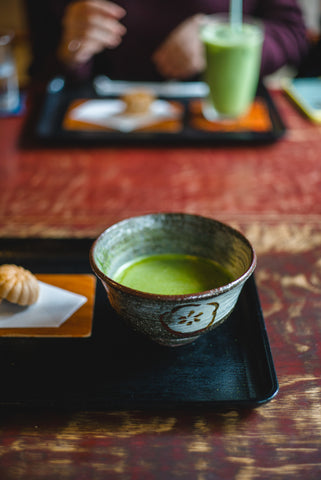
A simple answer, yes, tea can help us in stress relief and give us a better mood and surprisingly, longer time of focus if you want to complete some tasks. Because of the L-theanine ( a type of amino acid) and balance the speed of caffeine release in our body.

In the fast-paced world we live in, for example the city we are at - Dubai, United Arab Emirates, most of us are seeking a natural and effective way to reduce our stress level, consider making Matcha or Oolong tea your daily companion.
In this blog post, we'll explore how can tea naturally make you feel better and relaxed, specifically oolong and matcha for stress relief.
The Science Behind L-Theanine:
Tea and caffeine are always in a pair, specifically the camellia sinensis tea plant, always contains caffeine, however, l-theanine is a gem found in tea.
Research suggests that l-theanine stimulates alpha waves* in our brain, which gives us a sense of calm and relaxation even in stressful situations. The combination of caffeine and l-theanine* is thought to enhance mental clarity and focus, offering a dual effects to combatting both physical and mental symptoms of anxiety disorders.*
Keep in mind, only camellia sinensis tea plant has such benefit, herbal tea like chamomile, lavender and herbal tea are not in this category.
Various types of tea, including black, green, oolong, white, purple, and pu-erh, have been linked to stress reduction. Notably, they all contain l-theanine, a compound known for its anxiety-fighting properties, anti-agin and the promotion of overall well-being.

A Cup of Matcha for Mental Wellness:
Scientifically speaking, Matcha is so far the most powerful tea which is a powdered green tea with intensified flavor and concentrated health benefits.
Back in year 1191, Japanese monks have been using matcha for religious ceremonial ritual. The ritual of preparing matcha has deep roots, especially in traditional tea ceremonies in Japan and China.* Tea was more than a medicine, but also a mean to communicate with our inner voice and energy. Monks and spiritual masters still use tea as an entry guidance for meditation.

The Ritual In A Cup Of Matcha:
In traditional Japanese matcha ceremonies, the preparation and service of matcha are elevated to an art form. This elaborate ritual of intention, focus, and meditation has transcended into a modern practice for many. The calming effects of matcha extend beyond its chemical composition, incorporating a mindful preparation and consumption process that can significantly contribute to stress reduction.
Other Stress-Relief Benefits of Tea:
Beyond stress relief, matcha has a spectrum of potential benefits, aligning with the broader context of well-being. It may aid in improving sleep, soothing digestive issues, and even addressing symptoms of anxiety disorders. The rich combination of antioxidants and the calming influence of l-theanine positions matcha as a holistic remedy for the mind and body.

What if you really don’t like matcha?
You can choose oolong tea, a semi-oxidized tea that is not grassy nor bitter, to help you in your journey to combat stress and promote mental wellness. Whether you savor it in a traditional ceremony or simply enjoy it with a teabag, the ritual and science behind tea make it a powerful ally in the quest for tranquility.
Referenece:
japan guide












